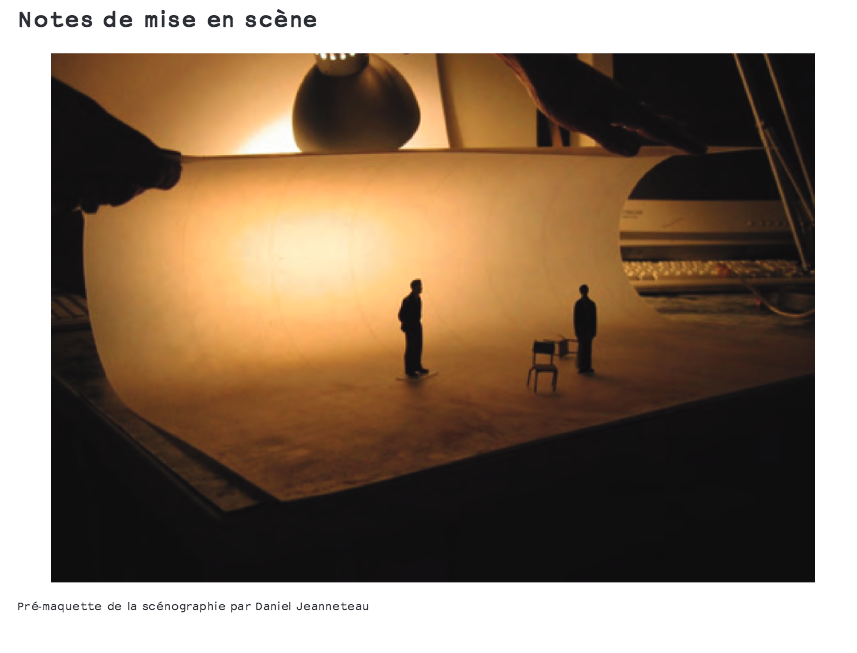First published in Gare au Theatre: 15 Auteurs de Monde, 1999
We are not safe and the sky can still fall on our heads and the theatre is there to remind us of that
Antonin Artaud
________________________________________________________
A woman enters a room. The room may be small or large, flooded with light or lit by a single candle. There may be no furniture, no windows in this room; the floor may be bare boards or a tapestry of rich carpets. She walks slowly. Or perhaps she is running. There are people gathered in one corner of the room. They are silent. They are watching the woman. She turns to them. She need not acknowledge them. She already knows they are present. She speaks to them. What does she tell them? She can tell them anything. They listen.
What follows an action is another action. As a word follows a word. As one breath follows another.
Theatre is an act brought about by the collective will of a community, enacted by those skilled in its arts. It is a collaborative journey from the moment in which we live into a present moment we imagine. It is a parallel reality. It is a metaphor.
What does it mean to pray? What does it mean to act? In theatre these two questions amount to the same question. A question asked by those who make theatre and by those who witness it. Or should be.
Both to pray and to act mean to call upon our imaginations to rise to a moment of recognition and necessity. To recognise is to know again. To know what again? And what is it that we need?
We need to know that we are not alone. We are too much alone.
Since the 19th century theatre has been viewed as an organ of dissent in the body politic. This dissent has centred around the theme of the individual’s place in society. Any commitment to this kind of dramatic radicalism requires a consistently dissenting stance. The theatre artist must confront not only the overtly political questions of his/her time but also the world of feeling (this is the genuine radical stance).
Dissent can never be an industry. Unless both the dissent and the industry are corruptions.
Theatre occurs and then it is over. It is not an artifact. The act of theatre does not linger. It cannot be recorded. It resides only in the memory of those who witness it. Theatre is mortal; a mortal ritual.
All rituals are transgressions. Transgressions agreed upon. Transgressions to be celebrated. They enable the passage of a soul from one place to another. From ignorance towards knowledge, out of darkness into light, from youth to adulthood, virgin to bride/groom.
Rituals enact, repeat, remember and portray, they are acts common to all cultures, to all times. Why is that so? Why do we need to see again what we already know?
No act of theatre is natural. It always leaves something out. It always includes something unnatural. Our presence at an act of theatre is a collaboration with illusion, a subversion of reality, a transgression of materialism, a gamble on the existence of the spiritual.
Under the cloak of action the beast of thought.
The audience witnesses what occurs. Nothing else. There is nothing but the will of the actor in play moment to moment. The moment an act occurs stands as it occurs. In the presence of its witnesses. Within the capacities of the actor who is present at the moment of action, who creates before our eyes that moment’s reality. Or does not. Failure is immanent. Success is temporal. The next moment has already erased the previous. Nothing is at play but will and time. The audience witnesses this play of forces. In the feet and the hands, the torso bent or upright, in the eye’s sheer weight, in the breath an instrument of thought. This struggle to remain present. Because theatre is nothing else but this presence. The actor wills this presence. The audience have willed him/her to do so.
Theatre is mortal. Theatre can be either an affirmation or a denial of that state. Here. Now. We will face ourselves.
Or we will be betrayed by calmatives.
Life is not calm. Only the very few think it is; these are the privileged. Together with those who aspire to be among the privileged. The dogs beneath the table, salivating; the child you ignore; the servant you tolerate; the student you prompt; the Molieres without the wit; the Shakespeares without poetry.
Language, memory, consciousness: theatre’s trinity, continuously giving birth to one another, continually astonished by one another.
The choice as to what an act of theatre may be is a collective responsibilty. In theatre no one acts alone. Ever.
One thought is enough, and space enough to stand, enough light to see, a moment however brief to which we dedicate our presence, one turning towards, one single glance, is sufficient to see what we make of ourselves.
An actor walks onto a stage. She is already a metaphor. She is either well or badly drawn.
There is nothing else to decide.

